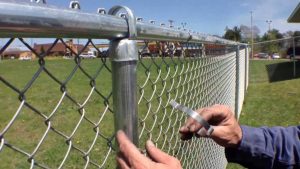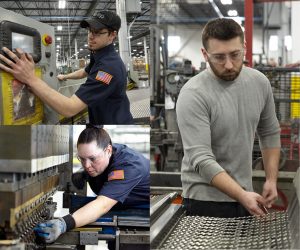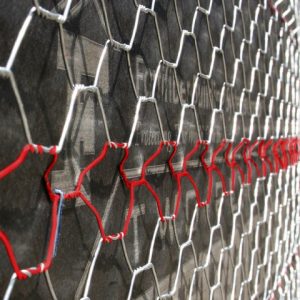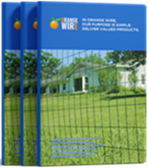When they said “black never cracks”, we bet they were talking about black vinyl-coated hexagonal wire netting. Tried, tested, and passed through the test of time, black vinyl-coated hexagonal wire netting is more durable than any other color.
Why choose black vinyl-coated hexagon wire netting for your garden?
The PVC coating is available in different colors but why black?
Well, black PVC lasts longer than other PVCs. It acts as a protective shield against weather extremities and prevents corrosion and rust.
First,
What is hexagonal wire netting?
Hexagonal wire netting is a woven wire mesh structure made from carbon wire. It is used for fencing, gardening, cages, and decoration. As the openings are hexagonal, we call them hexagonal wire netting.
Hexagonal wire netting can be PVC coated or galvanized or in some cases, both. The weaving structures can be twisted, reverse twisted, or double twisted.
Now,

What does PVC coating mean and what does vinyl-coated wire mean?
Applying PVC coating to surfaces is what we call vinyl dipping. Which means adding a protective layer to the metal structure to save it from deterioration.
The PVC coating is a synthetic material that is used to cover the surface of the metal and it acts as a protective layer. Since welded wire fences or hexagon wire mesh are weaved or welded structures. They have joints that can easily wear and tear in tough conditions.
In simple words, the Vinyl coating protects the structure from both inside and outside damage. As hexagonal wire netting is usually flexible. So there is more chance of friction-based wear and tear.
Also, PVC protects the metal surface from rain and electric current. It guards the netting against wear and tear and also keeps it safe from direct damage by animal or human interaction.

What is the difference between vinyl-coated and galvanized fences?
Here you need to understand what is the difference between galvanizing and vinyl coating. Galvanizing is dipping your wire structure into zinc and giving strength to the metal itself. This is usually done on metal surfaces to protect them from rust and corrosion. Galvanizing improves the overall life of the wire netting structure. (whether PVC is coated or not).
PVC on the other hand is dipping wire netting into a synthetic resin called polyvinyl chloride. It is a thin plastic-like coating. PVC acts as a barrier between damage and the wire netting structure.
An important thing to know here is that PVC coating can be done on galvanized wire fence structures too.

Now as we use both types of coating on wire fencing so which one is better? This highly depends on the usage and type of wire netting material.
If we are talking about welded wire fencing, we know they are used in more complex projects that require the better “metal” itself. So galvanizing is a better option for them. For hexagonal wire netting, the structure is weaved, used in projects such as fencing or cages, and is more in “direct contact”. So the vinyl-coated fence is a better option with hexagonal wire netting.
What is 90″ height black hex netting?
Normally, hexagonal wire netting is called chicken mesh but 90″ inch-tall black hex netting is called deer mesh. It has an extra tall height and refrains comparatively larger animals from jumping in or out of your fence.
This is best for garden use because of its tall height and as the fence is larger, you don’t need to join two sheets to make a larger fence.

What are the advantages of the black PVC coating on your 90″ hexagonal wire netting?
Mostly, We use Hexagonal wire netting in fencing, to contain animals, and for decorative purposes. This type of wire netting is more prone to damage. The black vinyl coating protects it.
1. From damage done by direct contact.
In animal fencing or tennis court decorative fencing, there is a more chance of damage to hexagonal wire netting. PVC protects the wire netting from breakage and wear and tear through direct corrosion. Also, a deer can’t clearly see the end of black netting and so they don’t jump over it.
2. Damage by climatic conditions.
Direct exposure to sunlight, rain, and dust weakens the metal surfaces. So vinyl coating is a barrier between climatic damage and the metal structure thus improving the life span of a product.
3. From Rust damage
In gardens, vines and plants can easily grow up against the fencing. Sometimes the fencing acts as a “ladder” to them. Without PVC coating, your hexagonal wire netting structures will attract rust faster than you could prepare for. So basically it saves your time, effort, and repair cost.
4. Electricity resistance
Black vinyl is an insulator and that is why black PVC is done on electrical wires too. Your fencing material is metal so to be safe black PVC coating is a sane choice. Keep in mind that bare metal can even attract electrical shocks during storms.
5. From aesthetic disaster
Black seems more refined and goes with variant decorative styles. Whatever color theme you are following in your garden, black won’t mess up that.
6. Budget-friendly
As a 90″ deer fence has an easy installation method and low labor cost, with all of the above advantages, it is very budget friendly too.

What are the other colors in PVC coating and why not them?
Vinyl coating is available in variant other colors. Some of the commonly used other colors are blue, green, yellow, white, brown, grey, and transparent.
Now why black vinyl-coated fence panels? Is a simple thing to understand. Why do we choose a black dress over others? Because it’s safe, generic and never goes wrong anywhere.
Hexagonal wire netting for your garden needs to be both safe and pleasing in an aesthetic sense. Imagine a white PVC coating, getting loaded with dust, or the yellow one, looking awkward with your overall decorations.
Also, don’t forget that insulating point. Black doesn’t conduct heat and that is why is more protective against weather damage.
Other colors are also used in wire netting but for different purposes. For example white is good for roofing structures as it reflects heat, keeping the inside cool. Similarly, for live wires, Red PVC coating is used as an insulator.

How long does a vinyl-coated hexagonal wire fence last?
If you want your hexagonal wire netting to last longer, Vinyl coating is the most durable and safe solution. As the hexagonal wire is a woven pattern so galvanization is not the final solution to protect it. You still need PVC for the longer and more durable life of wire netting.
The age of fencing also depends on what type of galvanizing is being used. For simple wire fencing mostly, grade-1 galvanization is done. This is cheap and lasts up to 10-11 years.
Due to its common usage in fencing and pens, the hexagonal wire netting still needs to be protected against direct corrosion. Also, hexagonal wire netting is usually used in low-budget simple projects. Going for high-grade galvanizing is just an irrelevant increase in cost. PVC adds another 30 years to your wire fencing life.
So a vinyl-protected hexagonal wire fence can last up to 50 years. This is enough in one lifetime. Here we may tell you that PVC coating itself lasts 100 years. However, in wire fencing, due to friction and wear and tear, it can break.
Conclusion
In the end, all we have to say is that black vinyl-coated 90″ hexagonal wire netting is a perfect solution to reduce costs and increase your safety. Not to mention it also keeps the aesthetic factor in check.
Final verdict: Your garden needs it!








